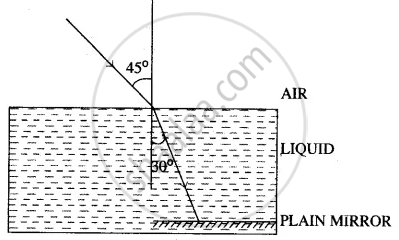Advertisements
Advertisements
Question
If the angle of incidence is greater than the critical angle, light is not refracted at all, when it falls on the surface from a denser medium to a rarer medium.
Options
True
False
Solution
This statement is true.
APPEARS IN
RELATED QUESTIONS
A tank of water is viewed normally from above.
- State how does the depth of tank appear to change.
- Draw a labelled ray diagram to explain your answer.
An object in a denser medium when viewed from a rarer medium appears to be raised. The shift is maximum for ______.
A ray of monochromatic light enters a liquid from the air as shown in the diagram given below:

Copy the diagram and show in the diagram the path of the ray of light after it strikes the mirror and re-enters the medium of air.
A ray of monochromatic light enters a liquid from the air as shown in the diagram given below:

Mark in your diagram the two angles on the surface of separation when the ray of light moves out from the liquid to air.
After a robbery, if a window has been broken, there will be tiny particles of glass. Some of these will be found at the scene of the crime and some may be caught in the thief’s clothing. If the police can prove that these particles are identical, they have a strong case.
A method of doing this is to suspend the particles of glass in a special liquid. Light of a single colour is thrown through the liquid and the particles viewed through a microscope. The temperature of the liquid is then slowly altered. This alters the speed of light through the liquid (i.e., it alters the refractive index). At one particular temperature, the particles of glass disappear. It this happens at the same temperature for both sets of glass particles, they probably came from the same broken pane of glass.
Complete and copy the diagram to show how light bends when it travels from the liquid to the glass and back to the liquid, If the light speeds up in the glass.
